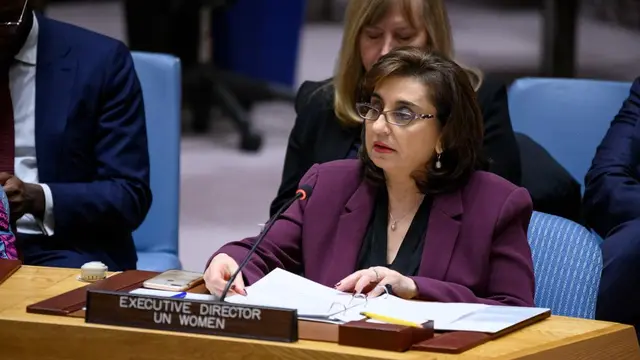The head of the United Nations entity dedicated to gender equality said on Tuesday that the status of women is "under siege," more than 20 years after the UN Security Council passed a milestone resolution on women, peace, and security.
The debate is on the theme "towards the 25th anniversary of resolution 1325." The resolution was adopted by the Security Council in October 2000, recognizing that women have a right to full, equal, and meaningful participation in peace processes, conflict resolution, and peacebuilding.
A concept note on the open debate, prepared by Mozambique, which now holds the Security Council presidency, pointed to the fact that "women continue to be, to this day, the segment of society most affected by armed conflicts around the world."
Women's rights continue to be seriously violated, and they continue to be marginalized and excluded from decision-making in matters of peace and security, said the document.
More women than ever hold political decision-making posts worldwide, but gender parity is still far off, according to a report jointly released Tuesday by the Inter-Parliamentary Union (IPU) and the UN Women.
The report, presenting the latest rankings and regional distribution of women in executive positions and national parliaments as of Jan. 1 of this year, showed that the number of women in political leadership roles had increased overall.
However, women are still deeply under-represented in government leadership roles and remain a minority as heads of state and government, according to the report.
At the very start of this year, 11.3 percent of countries have women heads of state (monarchy-based systems excluded), and 9.8 percent have women heads of government. These represent an increase from a decade ago when figures stood at 5.3 percent and 7.3 percent, respectively.
According to the report, only 13 countries, mostly in Europe, have gender-equal cabinets, with 50 percent or more women cabinet members serving as ministers. Nine countries have no woman cabinet member heading any ministry.
The report also showed that men dominate policy areas such as economy, defense, justice, and home affairs portfolios. Women only comprise 12 percent of cabinet ministers leading defense and local government portfolios, 11 percent in energy, natural resource fuels, and mining portfolios, and 8 percent in transport portfolios.
"It is obvious that we need a radical change of direction," Bahous told the Security Council debate.
She called for mandating women's participation in every meeting and decision-making process "in which we have authority."
"We need to broaden our reach to get resources to those who most need them and don't have them," added Bahous.
(Xinhua News Agency)
 简体中文
简体中文

